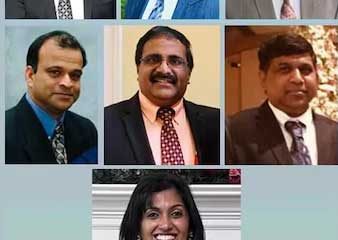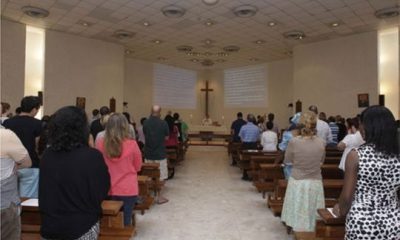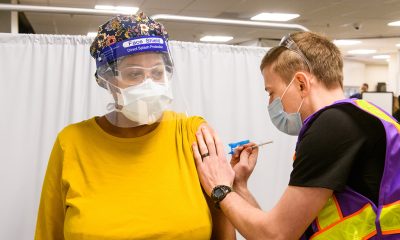us news
Half of Covid’s patients in Europe

About half of all Covid-19 deaths appear to be happening in care homes in some European countries, according to early figures gathered by UK-based academics who are warning that the same effort must be put into fighting the virus in care homes as in the NHS.
Snapshot data from varying official sources shows that in Italy, Spain, France, Ireland and Belgium between 42% and 57% of deaths from the virus have been happening in homes, according to the report by academics based at the London School of Economics.
Published official data for care homes in England and Wales are believed to significantly underestimate deaths in the sector, with the Office for National Statistics only recording 20 coronavirus-related deaths in all care homes in the week ending 27 March. New figures are due out on Tuesday, but are unlikely to be up to date.
Last week the industry body Care England told the Guardian the total figure was probably approaching 1,000, with deaths reaching into double figures at numerous homes. Over the weekend details of more deaths emerged, including 13 residents who have died at the 71-capacity Stanley Park care home in County Durham, and there have reportedly been five deaths at Almond Court in Glasgow.
On Monday Prof Chris Whitty, the chief medical officer for England, said 13.5% of the UK’s care homes had a confirmed case of coronavirus among their residents, up from 9% last week, with 92 more homes detecting cases in the previous 24 hours.
But the spread of the virus and its lethality in care homes in five EU countries appears to be higher, according to academics who are calling for better UK data and a more urgent response to the crisis in care homes.
In its first review of early international evidence, researchers from the International Long Term Care Policy Network found the most robust data was available in Ireland where, as of Saturday, 54% of deaths from coronavirus occurred in care homes, according to centralised government figures.
In Italy, a government survey covering deaths in 10% of the nations’ care homes suggested 45% of all deaths in that country could be in care homes, while central government data in France released at the weekend showed the same proportion of the 13,832 deaths in that country happened in care. In Belgium, health ministry figures showed 42% of Covid-19 deaths happened in care homes, and in Spain leaked regional government data suggested 57% of the country’s death toll from 8 March to 8 April was from care homes.
The figures came from different sources and the academics stressed that differences in testing availability and policies and approaches to recording deaths make international comparisons difficult.
But one of the report’s author’s, Adelina Comas-Herrera, of the LSE’s care policy and evaluation centre, said that given the fast-moving situation “we’re trying to document it as it happens and share it”.
“If we wait for perfect standards of evidence it will be too late to make any difference,” she said.
“To me it shows we will have to give equal resourcing in dealing with Covid between the NHS and social care. Care homes are places where physical distancing is almost impossible. It’s like a perfect storm: a susceptible population, not being able to implement the measures and the staff are not well supported and trained enough. Many of the staff are care assistants with very little medical knowledge.”
There have been three epidemiological studies of Covid-19 in care homes carried out by authorities in Seattle, one of which found that by 18 March, of 101 care home residents who contracted the virus in the preceding weeks, 34 died.
Dr Michael Head, a senior research fellow in global health at the University of Southampton, said the LCTPN’s summary of evidence “clearly shows the lack of focus on the elderly in care homes, despite their conclusion that care home residents may account for around half of Covid deaths in five European countries. Our elderly populations deserve better than to be ignored and forgotten.”
He cautioned that it remains hard to draw conclusions on precise numbers of deaths of elderly people in nursing and residential care around Europe and said that given there are few tests available, very few suspects cases will end up as confirmed cases.
He said: “Despite these limitations, we know that a range of infections can spread easily in vulnerable populations who live in nursing or residential care, for example norovirus, scabies, influenza, and here, the novel coronavirus.”
The Department of Health and Social Care said: “We are determined to give the social care sector the support it needs to respond to coronavirus and continue to work closely with Public Health England to monitor the impact on cares homes.
“We have published extensive guidance for care homes on admitting and caring for people during the outbreak, and have announced £2.9bn to help local authorities respond to pressures in key services, such as adult social care, and enhance the NHS discharge service, allowing patients to return home safely.”
us news
12,000 Souls Baptized in France Reporting ‘a Personal Encounter with Christ’

More than 12,000 people were baptized in France on Easter Sunday – a record number for the country where about 50% of the people say they do not believe in God.
The French Bishops Conference reports that despite the acceleration of “de-Christianization,” there has been a rise in requests for baptism in the Catholic Church within the last 10 years.
During an Easter service, 7,135 adults were baptized and more than 5,000 teenagers aged 11 to 17 were baptized, according to America Magazine.
The report explains that 31% more people were baptized this year than last year and that the number of adults, 18-25 years old, rose from 23% to 36% in the last year.
“In today’s French society, 80% of young people have not received any religious education,” Father Vincent Breynaert, director of the National Youth and Vocations Service, explained in the report presented on March 27. “They have very few preconceived ideas about the Church. What those asking for baptism have in common is that they had a spiritual experience and a personal encounter with Christ.”
The report also outlines that the requests for baptism are noticeable in bigger cities.
In Paris, there was a 27% increase from 2023 to 2024.
When it comes to demographics, those who are requesting to be baptized are more surprisingly “from families without religion.”
Around 5% of newly baptized Christians come from Muslim families.
“It is very surprising to see the often totally unexpected path taken by those who ask to be baptized,” said Bishop Olivier Leborgne of Arras, president of the Council for Catechesis and the Catechumenate, who added what is taking place is happening on a “bewildering scale.”
Catholic leaders in the country attested that “the Lord has decided to take the lead,” because the increase in baptisms cannot be explained otherwise.
Bishop Leborgne reports that Easter night in France this year was “particularly festive in many Catholic communities.”
“In a rapidly changing world, often disorientated, and a Church that is no less so, it could be that the Lord has decided to take the lead,” he shared.
Sources:cbn
us news
Fox News Host Lawrence Jones Delivers Powerful Gospel Message: I’m ‘Proud to Be a Believer’

“Fox & Friends” co-host Lawrence Jones has a deep-rooted faith, a passion for the Gospel, and a growing media career that has landed him on millions of TV screens each week.
“I come from generations of pastors,” Jones recently told CBN News. “My mom’s a preacher, grandparents are, so, the Gospel at large — knowing who Christ is and accepting [Him] to my heart … that’s all I know.”
The 31-year-old TV host said, although he grew up with the Gospel, it wasn’t until he left home and moved to Washington, D.C., and, ultimately, New York City that he fully put into practice what he had learned about God and the Bible.
“You start getting tested,” Jones said. “For me, the faith walk became real when life became real, and when you’re alone and you don’t have that support system being with you every single day.”
Jones, who recently released the book, “American Man: Speaking the Truth about the War on Masculinity,” said he’s not the type of person who will pretend he’s a “perfect Christian,” refusing to project a lie or mistruth. In the process, he said he’s striving to be more like Jesus each and every day.
“Part of the Gospel itself is understanding that Christ paid it all because I’m imperfect,” Jones said. “And anytime that we try to project ourselves as these perfect beings, I think we take His glory away, because … if we have it all together, then He wouldn’t need to pay it all on the cross for our sins.”
Jones, who sees life through a biblical lens, is in a truly unique position with a prime spot on TV, delivering news and information to the masses.
He called his work on “Fox & Friends” — and Fox News more broadly — an “exciting experience.”
“I’ve had the opportunity to grow in different ways,” Jones said. “Obviously, starting off as a contributor and then, from there, becoming Sean Hannity’s correspondent, to doing my own show on Saturday to now this incredible opportunity.”
Despite all the attention and success, Jones said he hasn’t found it tough to cling to his faith.
“I don’t find it a struggle to hold on to who God has called me to be and be that person,” he said, noting he’s “proud to be a believer.”
Jones has also been able to see his faith represented on the air, with “Fox & Friends” recently hosting the network’s second annual “Faith & Friends Concert Series,” a lenten celebration featuring Christian artists from across the music spectrum.
He said the faith-based music has sparked some powerful conversations.
“I think it’s been some of the most beautiful … conversations,” Jones said. “We’ve had people from our audience — messages about them crying on Sunday morning, people that haven’t been to church in a while, but we’re bringing church to them in their living room.”
Sources:faithwire
us news
യുകെ ഫാമിലി വീസയ്ക്ക് ഇനി ചെലവേറും

ലണ്ടൻ : അനധികൃത കുടിയേറ്റത്തിനൊപ്പം നിയമാനുസൃത കുടിയേറ്റവും പരിധി വിട്ടതോടെ പുതുതായി ഏർപ്പെടുത്തുന്ന കർശന വ്യവസ്ഥകളിൽ അവസാനത്തേതും ബ്രിട്ടൻ പ്രാബല്യത്തിലാക്കി. ഫാമിലി വീസയിൽ ബന്ധുക്കളെ സ്പോൺസർ ചെയ്യാൻ ബ്രിട്ടിഷ് പൗരന്മാർക്കും ബ്രിട്ടനിൽ താമസിക്കുന്ന ഇന്ത്യൻ വംശജർ ഉൾപ്പെടെയുള്ളവർക്കും 29,000 പൗണ്ട് (30 ലക്ഷം രൂപ) എങ്കിലും വാർഷികശമ്പളം ഉണ്ടായിരിക്കണമെന്ന വ്യവസ്ഥയാണ് നിലവിൽവന്നത്. ഇതുവരെ വേണ്ടിയിരുന്നത് 18,600 പൗണ്ട് (19 ലക്ഷം രൂപ); വർധന 55%. ഇന്ത്യൻ വംശജനായ പ്രധാനമന്ത്രി ഋഷി സുനകും ആഭ്യന്തര മന്ത്രി ജയിംസ് ക്ലെവർലിയും തയാറാക്കിയ കുടിയേറ്റ നിയന്ത്രണ പാക്കേജിലെ ഏറ്റവും ഒടുവിലത്തേതാണിത്.
അടുത്ത വർഷം ആദ്യമാകുമ്പോഴേയ്ക്കും ഇതു വീണ്ടും പരിഷ്കരിച്ച് വിദഗ്ധ തൊഴിലാളി വീസയ്ക്ക് അപേക്ഷിക്കുന്നതിനുള്ള ഉയർത്തിയ ശമ്പളപരിധിയായ 38,700 പൗണ്ടിന് (40 ലക്ഷം രൂപ) സമാനമാക്കാനാണു ബ്രിട്ടിഷ് സർക്കാരിന്റെ ആലോചന. 26,200 പൗണ്ട് ആയിരുന്ന വിദഗ്ധ തൊഴിലാളി ശമ്പളപരിധി 48% വർധിപ്പിച്ച് 38,700 പൗണ്ട് ആക്കിയത് ഈ മാസം തുടക്കത്തിലായിരുന്നു. ഇതേ വർധന ഫാമിലി വീസ ശമ്പളപരിധിയിലും ആലോചിച്ചിരുന്നെങ്കിലും ഒറ്റയടിക്കു നടപ്പാക്കുന്നത് പ്രതിപക്ഷ പ്രതിഷേധം രൂക്ഷമാക്കുമെന്ന ആശങ്കയിലാണ് ഘട്ടം ഘട്ടമായി കൊണ്ടുവരാനുള്ള നീക്കം.
Sources:globalindiannews
-

 us news10 months ago
us news10 months agoനോർത്ത് അമേരിക്കൻ പെന്തക്കോസ്തൽ റൈറ്റേഴ്സ് ഫോറം : രാജൻ ആര്യപ്പള്ളി പ്രസിഡന്റ്; നിബു വെള്ളവന്താനം സെക്രട്ടറി
-

 us news8 months ago
us news8 months agoനോര്ത്ത് അമേരിക്കന് പെന്തക്കോസ്തല് റൈറ്റേഴ്സ് ഫോറം; അറ്റ്ലാന്റാ ചാപ്റ്ററിന് പുതിയ ഭാരവാഹികള്
-

 us news11 months ago
us news11 months ago‘The Biggest Water Baptism in History’: 4,166 Baptized at Historic Beach from Jesus Movement
-

 world news11 months ago
world news11 months agoMuslim Husband Found Out His Wife Became a Christian; He Beat Her, Starved Her and Left Her in a Wild Animal Park—But God…
-

 National7 months ago
National7 months agoബൈബിൾ വിതരണം ചെയ്യുന്നതും നല്ല മൂല്യങ്ങൾ പഠിപ്പിക്കുന്നതും മതപരിവർത്തനമല്ല: അലഹബാദ് ഹൈക്കോടതിയുടെ നിര്ണ്ണായക വിധി
-

 world news9 months ago
world news9 months ago37 Christians Killed in Nigeria in Three Weeks
-

 world news11 months ago
world news11 months agoലേലത്തിൽ വെച്ചിരുന്ന ലോകത്തിലെ ഏറ്റവും പഴക്കമുള്ള ഹീബ്രു ബൈബിളിന് റെക്കോര്ഡ് തുക: ലഭിച്ചത് 314 കോടിരൂപ
-

 world news11 months ago
world news11 months agoയുഎഇ യിൽ ക്രൈസ്തവ ആരാധനാലയങ്ങൾക്ക് ഇനി ലൈസൻസ് നിർബന്ധം























